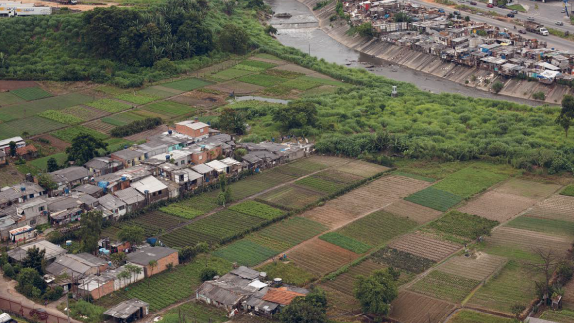In keeping with its reputation as a global hub of innovation, the City of Amsterdam has set itself the ultimate goal of becoming a fully circular city by 2050. The city has developed open-access tools and methodologies that are helping accelerate the transition to a circular economy. These fall under three key sectors: food and organic waste streams, consumer goods, and the built environment.
Circular economy ambitions
In 2020, the City of Amsterdam became the first city in the world to commit to becoming a 100% circular economycircular economyA systems solution framework that tackles global challenges like climate change, biodiversity loss, waste, and pollution. It is based on three principles, driven by design: eliminate waste and pollution, circulate products and materials (at their highest value), and regenerate nature. by 2050, aiming to halve its use of virgin materialsvirgin materialsMaterials that have not yet been used in the economy. by 2030. Its five-year circular economy strategy to achieve this goal is based on Kate Raworth’s Doughnut Economics model, which achieves economic development while staying within planetary boundaries. The city’s nine strategic circular economy ambitions focus on three key sectors:
Food and organic waste streams
Shortening food chains to provide a robust regional food system where local agriculture meets local food needs
Encouraging healthy and sustainable food consumption for the people of Amsterdam
Improving the processing of organic waste streams
Consumer goods
Using the city’s purchasing power to reduce its own consumption by 20% by 2030, from consumables and furnishings of city premises, to public real estate
Supporting citizens to use what they have more sparingly, through effective infrastructure and awareness raising
Making the most of discarded products through public-private partnerships to improve designs, ensure products are easily reusable, and extract value from products at their end-of-life.
Built environment
Bringing together stakeholders along the entire construction value chain to integrate circular principles into current and future developments
The City setting the right example by formulating circular criteria to challenge the market to innovate
In cases where the City is not the developing party, cooperating with the market to promote the supply and demand of recycled and reusable materials, reward circular private developments, and stimulate knowledge and data sharingsharingThe use of a product by multiple users. It is a practice that retains the highest value of a product by extending its use period..
Key initiatives
Alongside its five-year strategy, Amsterdam published a short-term innovation and implementation programme 2020-21 to kick-start a circular economy movement in the city with over 200 circular economy projects focused on food, consumer goods, and the built environment. The city’s work has been recognised by the Earthshot Prize, for which it was a 2022 finalist in the WasteFree World category.
Some of the key initiatives undertaken so far include:
CircuLaw
An initiative launched by the city of Amsterdam with Dark Matter Labs, CircuLaw aims to help policymakers and industry actors make better use of legal instruments within existing legislation to accelerate the circular economy transition.
Through an innovative protocol for legal analysis developed with universities, the Dutch Tax and Customs Administration and other partners, the tool translates complex public, private and tax laws into key information for policymakers on how to put them into practice. Along with the potential effects and legal feasibility of specific measures and guidance on how to apply them, it shows how different legal domains are connected and the levels of authorisation involved (state, province, or municipality), illustrated by examples. The initiative also publishes white papers on specific EU legislation that supports the circular economy, serving as a basis for the development of a new website section providing insight into the most relevant EU directives and legislations and the powers and possibilities emerging from it for decentralised governments.
The multidisciplinary team of 25 includes legal experts, developers, visual designers, user experience designers, content experts, circular economy experts and professionals on organisational dynamics and policy making. The initiative’s running costs are about EUR 1 million a year, funded by Climate KIC, Built by Nature, the Ministry of Internal Affairs, the National Transition Agenda for Circular Construction, several regional governments and the city’s innovation budget.
CircuLaw focuses on wood, wind turbines, and mattresses, however, in the future, it will expand to cover all materials and products. The initiative is limited to the Netherlands; however, the tool itself can be applied anywhere in Europe as the method for law analysis, developed in collaboration with law universities and code framework, is developed in line with open-source principles and published on Github. Background documentation and studies can be found on the CircuLaw Open Research page.
Amsterdam Circular Monitor
In 2022, Amsterdam published its Circular Monitor, a live database and dashboard on how materials flow through the city.
The monitor is based on Kate Raworth’s Doughnut Economics model and provides an overview of the city’s transition from a linear to a circular economy. It features statistics on material mass and the associated ecological impacts, including CO2 emissions, biodiversity, water pollution and land use. The social impacts of material use will be added in a future version. In addition, all circular economy research done by the city is published on the publicly accessible Monitor page. This includes themes such as circular jobs, waste statistics, and residents’ attitudes to the circular transition.
The data and insights allow policymakers to make evidence-based strategic and policy decisions. For example, the Monitor identified that emissions related to material use make up 78% of Amsterdam’s total CO2 emissions. By tracking 24 product groups that together cover all material flows in the city and estimating their environmental impact, the Monitor confirmed that the biggest impacts are covered by the three themes in the City's circular strategy: food, consumer goods and the built environment. There is ongoing work to increase the granularity of the data in each of these themes. For example, contractors that build and maintainmaintainKeep a product in its existing state of quality, functionally and/or cosmetically, to guard against failure or decline. It is a practice that retains the highest value of a product by extending its use period. the city's roads are now required to report their material use and associated environmental impacts at the product level. This allows the city to track progress towards increasingly specific circular economy targets such as reusereuseThe repeated use of a product or component for its intended purpose without significant modification. and take appropriate action to ensure these targets are reached.
The Monitor was developed by the city’s Research and Statistics department and the Chief Technology Office in cooperation with partners including TNO, GeoFluxus and Statistics Netherlands. Like CircuLaw, the methodology was developed to be open access so that other municipalities in the Netherlands can use it and accelerate their transition to a circular economy. Future steps will be to continue to increase data granularity and quality for each of the strategic themes and their sub-goals, helping to guide action to the most impactful areas as well as work on ensuring that the actions taken lead to measurable results, which is essential to evaluate the effectiveness of new and existing policies.
Other initiatives
Amsterdam has numerous other circular economy initiatives which demonstrate how the city is utilising all policy levers available to a city, for example:
A sharing economy action plan which led to multiple innovations such as sharing household items, space, modes of transport, and even food. (For more information on how this action plan was developed, see the case study, originally published in March 2019.)
Discounts for citizens to incentivise circular behaviour through the city’s well-established Stadspas discount card, such as a 40% reduction on clothing repairs.
The municipality is also working towards the reuse of building materials becoming standard practice with initiatives such as:
A digital inventory of available materials for architects and other built environment actors to incorporate. For example, in the neighbourhood of Buiksloterham, 80% of materials in public spaces are made from materials that are reused, recycled, or bio-based.
In 2021, the City of Amsterdam adopted the Green Deal Timber Construction, committing to constructing all new buildings with materials that are at least 20% timber/biobased in 2025. The city is working together with builders, knowledge institutes, investors and designers to make this happen.
The city also challenges the market to innovate circular and biobased solutions through focused selection criteria in land-tendering.
Budget, team and governance
The city has a dedicated circular team, which consists of 20 FTEs. Throughout the municipality, many more people work across departments and disciplines to make the transition toward a circular, future-oriented economy and city possible.
To implement the activities described in the implementation agenda 2023- 2026, the Amsterdam coalition agreement 2022-2026 has reserved funding for the circular economy and sustainability. For the current period, EUR 17.5 million has been made available. In addition, directors of municipal departments have scope to instigate policy changes within the current budget.
Challenges and lessons learned
A number of lessons learned by Amsterdam can help other cities implement circular economy strategies.
Open access tools and methodologies help speed up progress across the Netherlands and internationally. Openresearch.amsterdam is a digital platform for research, knowledge and innovation about Amsterdam and the metropolitan region. Researchers publish their research on their own pages, and the platform connects those pages to show relations, share knowledge, and facilitate collaboration. openresearch.amsterdam is part of the sustainable knowledge infrastructure of municipalities, universities (of applied sciences) and other stakeholders in the Amsterdam metropolitan area.
Establish a robust process to extract lessons and insights from pilot projects. While the programme had set out a ‘learn-by-doing’ approach, in practice, there was a lack of time as well as processes to formalise any lessons learned. Establishing a continuous learning process would help to ensure lessons are recorded in a more structured way such that they can be applied for future projects and translated into standard ways of working. Ensuring enough resources are available for individuals to transfer their experiences to the wider team is essential.
Include social and economic impact indicators. If possible, specify the impact potential of circular economy ambitions through short-term and systemic indicators that span environmental as well as social needs, especially around the labour market. Turning ambitions into measurable intermediate steps in an action plan can connect existing projects and activities to overarching ambitions as well as garner public support.
Use the municipality’s purchasing power to help pilots scale. Sub-national governments such as cities are responsible for almost 50% of procurement decisions. By being the first customer for successful pilot projects, the city can help them reach scale. Numerous other cities have also learnt lessons in shifting from linear to circular procurement.
Play to the strengths of city departments. Basing the projects on the strengths and development opportunities of different city departments helped Amsterdam garner maximum support across the administration.
What’s next for Amsterdam?
The Implementation Agenda 2023-2026 contains more than 70 activities that the municipality will develop together with the city over the next four years. The municipality works together with entrepreneurs, social initiatives and residents. More than EUR 14 million has been allocated for this cooperation. EUR 3.5 million will be used for the necessary system change that the municipality must organise so that companies can start working in a circular way. The focus is being put on consumer goods, the built environment and food and organic residual flows.






